UK ELECTION 2017: UK SET FOR HANG PARLIAMENT
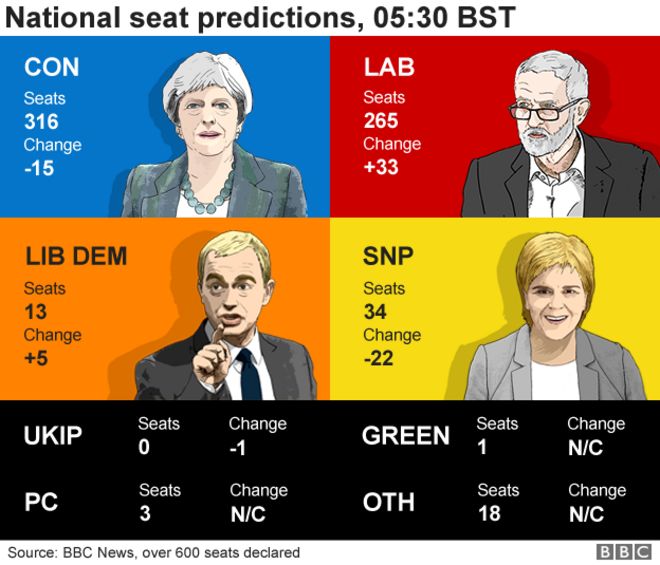
The
Conservatives have failed to win an overall majority, and the UK is now
set for a hung parliament, says the latest BBC forecast.
It shows gains for the Labour Party after Thursday's general election.
This
would be a humiliation for Prime Minister Theresa May, who chose to
call the election to try to strengthen her hand in talks with the EU on
Brexit.
Labour leader Jeremy Corbyn urged her to resign, but she said her party would "ensure" stability in the UK.
"At this time more than anything else, this country needs a period of stability," Mrs May said.
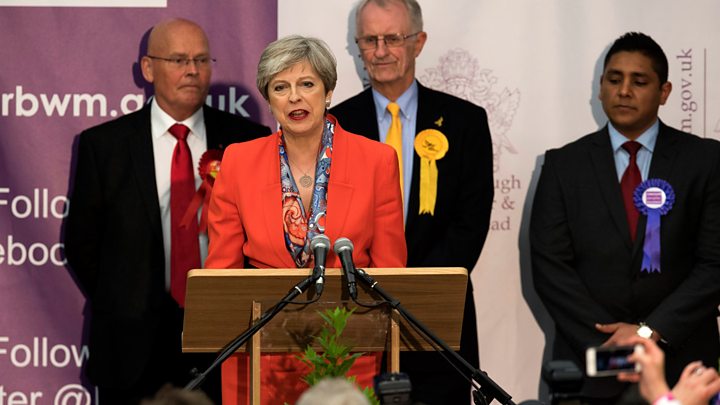
Theresa May says the UK needs a period of stability
"And
if, as the indications have shown and if this is correct that the
Conservative Party has won the most seats and probably the most votes,
then it will be incumbent on us to ensure we have that period of
stability - and that is exactly what we will do."
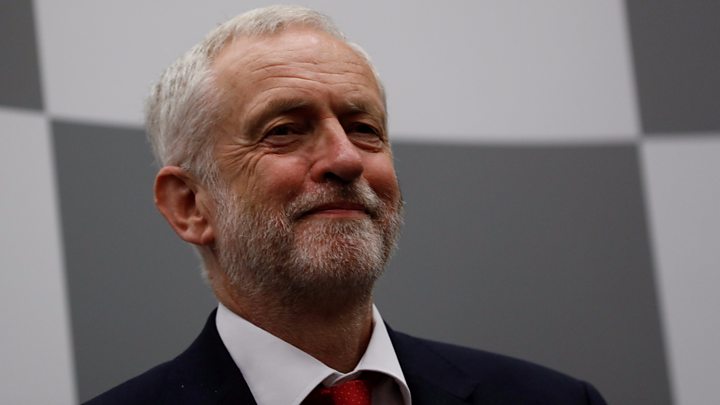
Labour leader Jeremy Corbyn: "I'm very, very proud of the campaign my party has run"
Mr
Corbyn earlier said: "If there is a message from tonight's results,
it's this: the prime minister called this election because she wanted a
mandate. Well, the mandate she's got is lost Conservative seats, lost
votes, lost support and lost confidence."
"I
would have thought that's enough to go, and make way for a government
that will be truly representative of all of the people of this country,"
he added.
With more than 600 seats now declared, the Tories are projected to get 316 seats, Labour 265, the SNP 34 and the Lib Dems 13.
The pound earlier fell sharply in value after the BBC/ITV/Sky Exit poll was published when the voting ended at 22:00 BST (21:00 GMT).
Final election results are expected by Friday lunchtime.
The
biggest shock of the night so far has been the Liberal Democrat MP Nick
Clegg losing his seat to a Labour candidate. He was deputy prime
minister of the UK from 2010 to 2015 in a coalition government with the
Conservatives.
Former Scottish National Party leader Alex Salmond was also defeated, losing his seat to a Tory contender.
A
total of 650 Westminster MPs will be elected, with about 45.8 million
people entitled to vote. A party needs 326 seats to have an overall
majority.
Prime
Minister Theresa May - who had a small majority in the previous
parliament - called an early election to try to improve her negotiation
positions on Brexit.
But analysts say it now appears the PM made a serious miscalculation.
The
BBC's political editor Laura Kuenssberg says Mrs May's decision may
prove to have been one of the biggest political mistakes of modern
times.
What does the forecast say?
The latest forecast suggests that the Conservatives will be 10 seats short of an overall majority.
Labour are predicted to gain 33 seats, the Tories lose 15 seats, the Lib Dems will gain five and the SNP lose 22 seats.
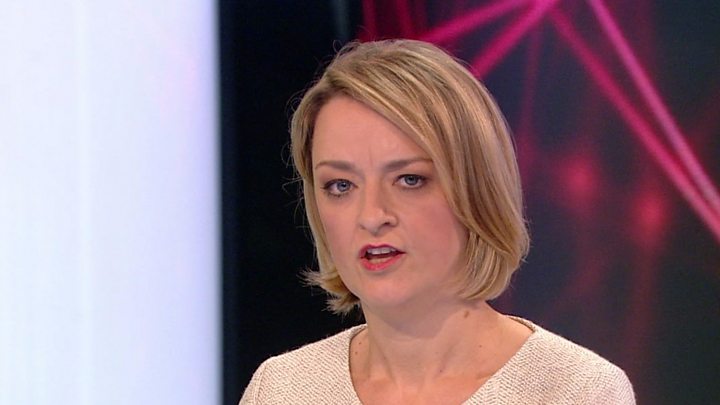
BBC's Laura Kuenssberg: Theresa May has played a "high risk" political game
The Green Party would be unchanged with one seat and Plaid Cymru still have three MPs in Wales, according to the poll.
Northern Ireland has different political parties.
How other parties have reacted?
SNP leader Nicola Sturgeon said the election "has been a disaster for Theresa May".
"Her
position I think is very, very difficult. We have to wait and see how
things shake out," Mrs Sturgeon said, adding that she was "disappointed
at the SNP losses".
Leader
of UK Independence Party Paul Nuttall tweeted: "If the exit poll is
true then Theresa May has put Brexit in jeopardy. I said at the start
this election was wrong. Hubris."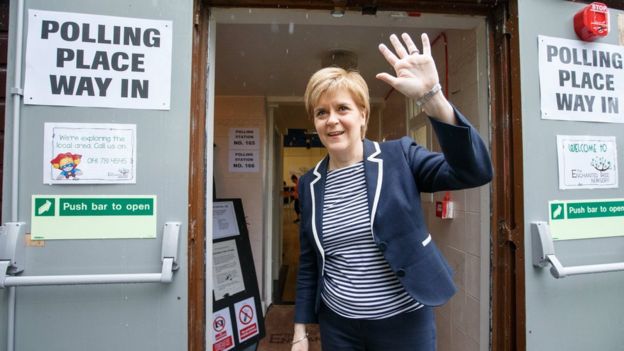 In Glasgow, SNP leader Nicola Sturgeon voted at a local community hall
In Glasgow, SNP leader Nicola Sturgeon voted at a local community hall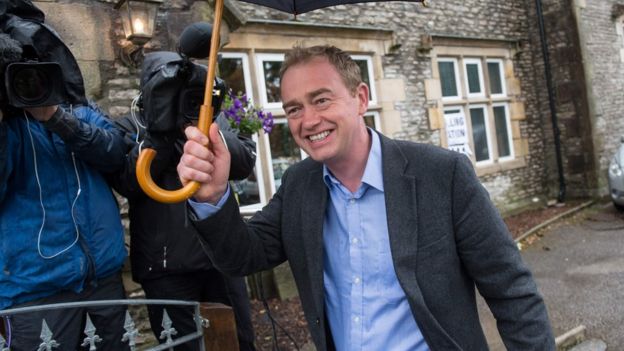 Lib Dem leader Tim Farron looked cheerful despite the rain after voting in Kendal, Cumbria
Lib Dem leader Tim Farron looked cheerful despite the rain after voting in Kendal, Cumbria
 In Glasgow, SNP leader Nicola Sturgeon voted at a local community hall
In Glasgow, SNP leader Nicola Sturgeon voted at a local community hall Lib Dem leader Tim Farron looked cheerful despite the rain after voting in Kendal, Cumbria
Lib Dem leader Tim Farron looked cheerful despite the rain after voting in Kendal, Cumbria
Lib
Dem President Baroness Brinton said her party could not work with
either Labour or the Tories as both are pushing for a "hard Brexit".
Green
co-leader Caroline Lucas earlier said she could "hardly dare hope" that
the exit poll was right, adding: "To be clear, Greens will never
support a Tory government."
Why the election matters - it's all about Brexit
The election will largely determine the UK's negotiation policies in upcoming negotiations with the EU on Brexit.
Theresa
May was against Brexit before last year's referendum - but now says
there can be no turning back and that "Brexit means Brexit".
The reason the prime minister gave for calling the election was to strengthen her hand during the negotiations.
The
Conservatives' priorities were set out in a 12-point plan published in
January and the letter formally invoking Brexit in March.
The key elements include:
No longer being bound by EU law and European Court of Justice rulings
Quitting the EU single market and seeking a "comprehensive" free trade deal in its place
Striking trade deals with other countries around the world
The
Labour Party campaigned against Brexit in the referendum but now says
the result must be honoured, and is aiming for a "close new relationship
with the EU" with workers' rights protected.
The party has set out several demands and tests it says Brexit must meet. These include:
Aiming for "tariff-free access" to the EU single market, while accepting "unchanged access" is impossible
Leaving the option of the customs union on the table
Refusing to accept a "no deal" scenario
Where UK's parties stand on Brexit
What about a possible impact on the UK economy?
When
the election exit poll was revealed, the pound immediately dropped by
2% as investors took a position that a hung parliament was a possible
outcome, writes BBC's Economics Editor Kamal Ahmed.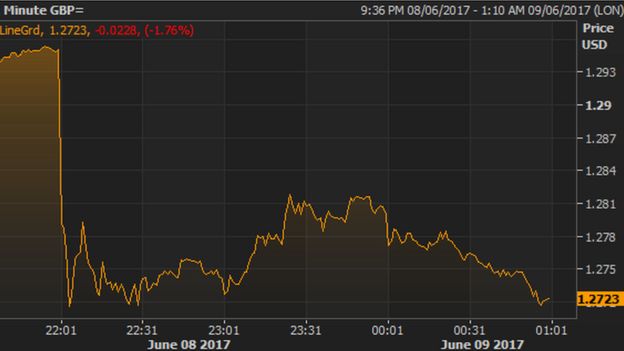 The pound fell sharply against the dollar after the exit polls were released.
The pound fell sharply against the dollar after the exit polls were released.
 The pound fell sharply against the dollar after the exit polls were released.
The pound fell sharply against the dollar after the exit polls were released.
Why
would that lead the currency to decline? Because a hung parliament
means that the government's direction of travel would be less certain.
Deals would have to be done. And those vital Brexit negotiations could become all the more difficult.
The future of the UK economy could be confused by a fog of political to-ing and fro-ing, our editor says.
Masengwa blog Ipo Play Store…Download HAPA ,Uwe unapata habari zote kwa urahisi zaidi

No comments: